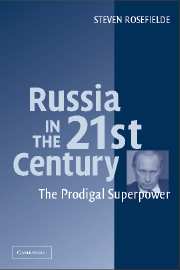Book contents
- Frontmatter
- Contents
- List of Figures and Tables
- List of Acronyms
- Preface
- Acknowledgments
- RUSSIA IN THE 21ST CENTURY
- Introduction
- 1 After “The End of History”
- 2 Prodigal Superpower
- 3 Structural Militarization
- 4 What Could Have Been Done?
- 5 Muscovite Metamorphosis
- 6 Military-Industrial Reform
- 7 National Vulnerabilities
- 8 The Miasma of Global Engagement
- 9 Putin's Choice
- 10 Candor
- Conclusion
- Glossary
- Notes
- Selected Bibliography
- Index
Preface
Published online by Cambridge University Press: 18 December 2009
- Frontmatter
- Contents
- List of Figures and Tables
- List of Acronyms
- Preface
- Acknowledgments
- RUSSIA IN THE 21ST CENTURY
- Introduction
- 1 After “The End of History”
- 2 Prodigal Superpower
- 3 Structural Militarization
- 4 What Could Have Been Done?
- 5 Muscovite Metamorphosis
- 6 Military-Industrial Reform
- 7 National Vulnerabilities
- 8 The Miasma of Global Engagement
- 9 Putin's Choice
- 10 Candor
- Conclusion
- Glossary
- Notes
- Selected Bibliography
- Index
Summary
Specialists and amateurs alike frequently hold strong views about Soviet and Russian military-economic potential, but their attitudes are seldom consistent. During the Cold War, it was fashionable to speculate that the East and West were converging, that systems were becoming mixed, that both sides shared a common interest in peace and would gradually reduce their military forces. Accordingly, analysts like Franklyn Holzman argued that the Soviets spent less on defense than America and inter alia that the healthy economic growth indicated by Goskomstat and CIA statistics was primarily attributable to the workability of the “reformed” command system. But in the aftermath of the Soviet collapse, it has become just as fashionable to blame the USSR's demise on its excessive defense burden and the deficiencies of central planning. And, of course, transitologists and now the European Union have officially proclaimed Russia a “market economy,” suggesting “blue skies” ahead, without a military cloud in the sky, since the contemporary defense burden is said to be half and the absolute dollar value less then a tenth the American level. Western economic and security advice to the Kremlin follows this script, stressing further liberalization without the slightest recognition that Russia's defense-industrial complex is just as large as ever and that Russia's economic and security drift is against the “globalist” tide. It is easy to understand the diverse partisan interests shaping these “approved” contradictions and even to sympathize in some regards with the disingenuousness, but insofar as policymakers believe what they say, their happy talk obstructs the resolution of serious problems vital to both Russia and the West.
- Type
- Chapter
- Information
- Russia in the 21st CenturyThe Prodigal Superpower, pp. xiii - xviPublisher: Cambridge University PressPrint publication year: 2004



